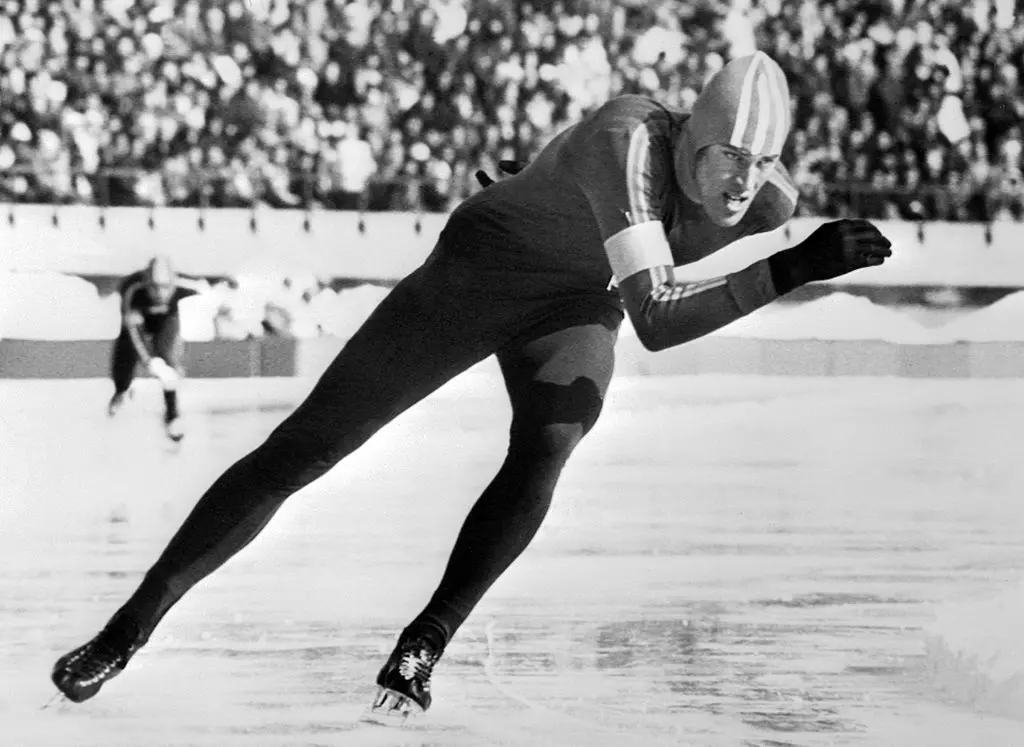Ard Schenk (NED) completed the 1500m in 1 minute and 58.7 seconds. It may not sound very fast compared to the current world record of 1.40,17, but on the outdoor ice of Davos, Switzerland, back in 1971, the Dutchman was the first to break the two-minute barrier in Speed Skating history.

Ard Schenk (NED) at the Olympic Winter Games 1972©AFP
He was the first to break the 15-minute barrier in the 10,000m too. In total Schenk set 18 world records in a prolific Speed Skating career, which encompassed three Olympic titles, three ISU World Allround Speed Skating Championships and three ISU European Allround Speed Skating Championships. Together with Kees Verkerk (NED) the tall blond farmer's son from the small rural town of Anna Paulowna laid the foundations of the everlasting popularity of Speed Skating in the Netherlands.

Van Karnebeek congratulates Roar Gronvold (NOR), Ard Schenk (NED) and Goran Claesson (SWE) at the Olympic Winter Games 1972©AFP
Schenk came from a Speed Skating family. His father Klaas participated in the 1932 European Championships in Davos and became the Dutch national coach in 1952. Klaas stepped down when his son Ard qualified for the national team in 1964.
Ard's first major success came in 1966 at the ISU European Allround Speed Skating Championships in front of a 20,000 home crowd in Deventer. It was the first ever live broadcast of a Speed Skating event in Dutch history and millions of people in the Netherlands watched the races. Kees Verkerk was on title course, but he fell in the final 10,000. His fall was instantly replayed on television and many spectators, not being used to live television and replays, thought he had fallen twice.

Ard Schenk (NED) at the Olympic Winter Games 1972©AFP
Schenk took advantage of his friend and teammate's crash and ran away with the title. The 1966 Championships were the beginning of the Ard & Keessie era in Dutch Speed Skating. The two skaters were immensely popular and the Dutch streets were empty when major Championships were broadcasted in the 1960s and 70s, because everybody was watching the races on television.
Verkerk, who was two years Schenk's senior, had the upper hand in the first years of their rivalry, winning the 1966 and 1967 ISU World Allround titles, the 1967 ISU European Allround title and gold in the 1500m at the 1968 Olympic Games in Grenoble.

Ivar Eriksen (NOR), Cornelis Verkek (NED) and Ard Schenk (NED) at the Olympic Winter Games 1968©AFP
From 1970 onward Schenk won three consecutive ISU World Allround Speed Skating Championships in a row, trading places with Verkerk as the top dog in Dutch Speed Skating. By the end of the 1970-1971 season he held world records in the 1000m, 1500m, 3000m, 5000m and 10,000m.
The 1972 Olympic Games in Sapporo were the pinnacle of his career. Schenk won three of the four distances (1500m, 5000m, 10,000m), only missing out on a fourth title because of a crash in the 500m. Verkerk took silver in the 10,000m, despite Schenk doing him a favour swapping places in the draw to hand his teammate a chance to skate an early race with better ice conditions.

Ard Schenk (NED) at the Olympic Winter Games 1972©AFP
Not only his three gold medals impressed the world in Sapporo, the tall blond handsome Dutchman got a lot of attention from the ladies during his Olympic victory trail in Japan and became known as the 'Apollo of the Ice'.
Schenk usually trained at the Amsterdam based 'Jaap Eden' Ice rink, next to football club Ajax. The speed skater regularly played card games with Johan Cruijff and other team members of threefold European Cup winners. While the professional football players were very well paid, the equally popular Dutch speed skaters were still amateurs.

Ard Schenk, Edwin van den Dungen and Johan Cruijff at a Book Presentation 2011©Getty Images
After his Olympic success in 1972 Schenk decided to go professional as well. He joined the newly set-up International Speed Skating League with fourteen international colleagues. Schenk won the ISSL professional World title, but the League ceased to exist after two seasons and Schenk quit Speed Skating.
The Apollo of the Ice briefly tried his luck as a sports reporter for Dutch television, but soon returned to his original profession as a physiotherapist. In 1992, 1994 and 1998 Schenk was Chef de Mission of the Dutch team at the Olympic Winter Games.
His own Olympic medals were long gone by then. Schenk sold those in the 1970s to buy a Ford Galaxie for a road trip in the United States. He drove from east to west twice. Those memories were more important than 'staring at a prize cabinet', he said.